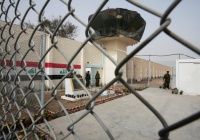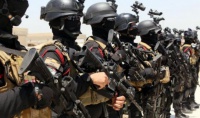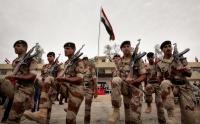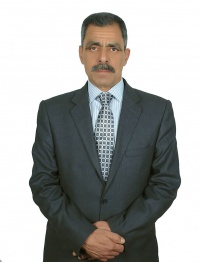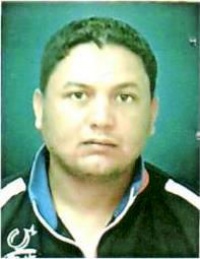Iraq: US Occupation Forces Involved in Two Cases of Enforced Disappearance
In November 2016, Alkarama and Al Wissam Humanitarian Assembly wrote to the United Nations Working Group on Enforced Disappearance (WGEID) regarding the cases of Mazen Al Izzi and Ali Al Dahi who both disappeared after their arrest by the US and Iraqi forces, hoping the UN experts' intervention will help shed light on their fate and whereabouts.
Iraq: Disappearance of Maan Al Samarrai from Abu Ghraib Prison since July 2013
Maan Al Samarrai, a 41-year-old resident of Al Karkh, Baghdad, was detained in Abu Ghraib prison when, on 23 July 2013, hundreds of convicts escaped, while the remaining prisoners were transferred to unknown locations. His family does not have any official information on his fate and whereabouts since then, despite the fact that his brother, now free, reported they were detained together in Nasiriya prison in June 2015 and another informal contact referred that in December 2015 he was held in Baghdad International airport detention centre. Concerned about his fate, Alkarama and Al Wissam Humanitarian Assembly informed the United Nations Committee on Enforced Disappearances (CED) of his case, hoping that this treaty body − a committee of independent experts that monitors implementation of the International Convention for the Protection of All Persons from Enforced Disappearance (ICPPED) by its State parties − could help locate him.
Iraq: A Man Sentenced to Death While Disappeared on the Basis of Confessions Under Torture
On 21 September 2016, the mother of Mohamad Al Jabouri, a 36-year-old construction worker, was able to visit him in Tasferat prison, Baghdad; after more than one year of his disappearance. He told her that during his secret detention, he was heavily tortured by Iraqi security officers and forced to sign a "confession" he was not allowed to read beforehand. This document was the sole source of evidence in his trial before the Central Criminal Court that sentenced him to death on 17 March for alleged "terrorist crimes". Concerned over his fate, Alkarama and Al Wissam Humanitarian Assembly sent his case to the United Nations Special Rapporteur on Torture (SRT), Juan Méndez, asking him to call upon the Iraqi authorities to annul his sentence.
Iraq: Alkarama Reports Three Cases of Disappearances by the Army to the UN
Between July and September 2014, Mohammad Al Janabi, Imad Al Janabi and Hisham Al Masari were in their respective houses in Latifiya and Mahmoudiyah when officers of the 17th Division of the Iraqi army, a key force in the fight against the Islamic State (IS), broke in and arrested them. The day of their arrest was the last time their relatives could see them, as they remain disappeared up until today. Concerned about their fate, on 30 September 2016, Alkarama and Al Wissam Humanitarian Assembly submitted their cases to the Committee on Enforced Disappearances (CED) hoping that the UN experts’ intervention will help locate them.
Iraq: Enforced Disappearances of Three Displaced Persons Following Their Arrest at Checkpoints by State-sponsored Militias
Between May and June 2015, Ahmad Al Hajjar, Ahmad and Khalid Al Dulaimi disappeared after their arrest at checkpoints controlled by State-supported Hezbollah brigade. Displaced from their hometowns of Mosul and Ramadi, cities then under the Islamic State (IS)'s rule, they were suspected of being its "supporters" and brought to unknown locations. Concerned over their disappearance, Alkarama and Al Wissam Humanitarian Assembly sent their case to the United Nations Committee on Enforced Disappearances (CED), hoping that this treaty body − a committee of independent experts that monitors implementation of the International Convention for the Protection of All Persons from Enforced Disappearance (ICPPED) by its State parties − could help locate them.
Iraq: Disappearance of Four Men of the Janabi Family From Latifiya since October 2014
On 13 October 2014 at 9 am, a group of several officers of the Iraqi security forces broke in the house of Mohamad Janabi in Latifiya, Babil governorate, and arrested him together with his son Najim his uncle Ahmad Janabi and the latter’s son Mehdi. Brought away to an unknown location, their relatives remain unaware of their fate and whereabouts almost two years after their abduction. Concerned over their disappearance, Alkarama and Al Wissam Humanitarian Assembly submitted their case to the United Nations Committee on Enforced Disappearances (CED) in the hope that its experts’ intervention will help shed light on their fate and whereabouts.
Iraq: A 67-Year-Old Disappears After His Arrest by the Police and Militiamen
On 8 June 2014, Dawood Al Issawi was in his home with his family when a patrol of police officers and militia men broke in, arrested him and took him to an unknown location. This was the last time his family saw him, as he remains unforcedly disappeared until today. Concerned over his fate, Alkarama and Al Wissam Humanitarian Assembly sent a communication to the United Nations Committee on Enforced Disappearances (CED), hoping that this treaty body − a committee of independent experts that monitors implementation of the International Convention for the Protection of All Persons from Enforced Disappearance (ICPPED) by its State parties − could help locate him.
Iraq: Human Rights Activist Disappeared For a Year by State Sponsored Militia
On 19 August 2015, Waee Al Jabouri, lawyer and head of a human rights NGO, left his house in the morning and never came back. He disappeared after his arrest at a nearby checkpoint of the State sponsored militia Liwa Al Sadr. Concerned over his case, Alkarama and the Iraqi Observatory for Human Rights sent his case to the United Nations Committee on Enforced Disappearances (CED) hoping that this mechanism for the protection for human rights will help locate him.
Iraq: 26-year-old Citizen Abducted From his House in Latifiya Disappeared For Two Years
On the night of 1 July 2014, Hussein Azzawi was in his house in Latifiya, a town south of Baghdad, when 10 military officers broke in and arrested him, before taking him away in a pickup truck. Until today, his family was not able to obtain any information on his fate and whereabouts. Concerned over his fate, on 19 July 2016, Alkarama and Al Wissam Humanitarian Assembly sent a communication to the United Nations Committee on Enforced Disappearances (CED), hoping that this treaty body − a committee of independent experts that monitor implementation of the core international human rights treaties by its State parties − could help locate the victim.
Iraq: Professor of Engineering Salih Al Dulaimi Sentenced to Death on the Basis of Confessions Under Torture
On 12 May 2016, Salih Al Dulaimi, professor at the Electrical Engineering Department of the College of Engineering, University of Anbar, was sentenced to death on the basis of Iraq Antiterrorism Law by the Iraqi Central Criminal Court, the judge relying on statements Al Dulaimi made under heavy torture and alleged information provided by the US intelligence. As Al Dulaimi is clearly a victim of arbitrary detention, Alkarama and Al Wissam Humanitarian Assembly sent his case to the United Nations Working Group on Arbitrary Detention (WGAD), demanding the five UN experts to call upon the Iraqi authorities to immediately release him.
 Algeria
Algeria Bahrain
Bahrain Djibouti
Djibouti Egypt
Egypt Iraq
Iraq Palestine/Israel
Palestine/Israel Jordan
Jordan Kuwait
Kuwait Lebanon
Lebanon Libya
Libya Mauritania
Mauritania Morocco
Morocco Oman
Oman Qatar
Qatar Saudi Arabia
Saudi Arabia Sudan
Sudan Syria
Syria Tunisia
Tunisia United Arab Emirates
United Arab Emirates Yemen
Yemen Other Countries
Other Countries


